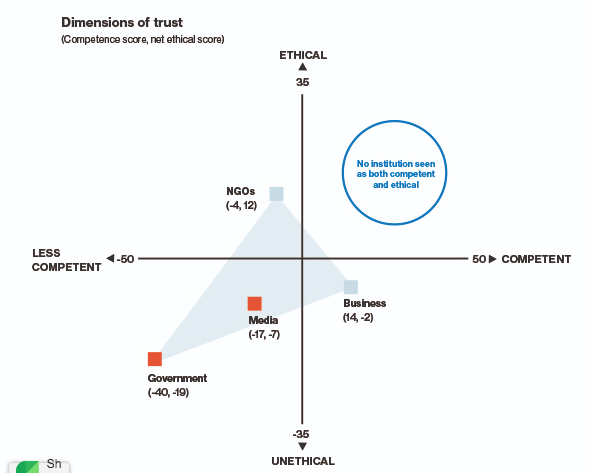Reading: New Challenges in Marketing Ethics
New marketing channels create opportunities for new tactics, but sometimes these developments bring new ethical challenges. Eventually, society may establish what is acceptable behaviour and what is not, but that process takes time. The 2020 Edelman Trust Barometer Study[1] found that customers increasingly expect brands to “place customers ahead of profits and have ethical business practices,” and Interbrand’s 2018 brand study noted that successful businesses are those who are willing “to simultaneously look through a microscope and a telescope, to have the courage to intercept the future, not just flow with it, and, to take decisive action that makes a real impact.”

Societal expectations are changing at a faster rate due to technology. Below are three case studies that show the evolution within the few years and how corporations respond.
Case Study 1: Pepsi and the Kendall Jenner Ad (2017)
In 2018, Pepsi’s advertisement featuring Kendall Jenner quickly went viral, and impacted the brand Pepsi. The ad depicted Jenner joining a protest and seemingly resolving tensions between demonstrators and police by handing an officer a can of Pepsi. Within hours of release, the ad faced intense backlash on Twitter, Facebook, and other platforms. Critics argued that it trivialized serious social justice movements, such as Black Lives Matter, by suggesting complex issues of racial inequality and police violence could be solved with a soft drink. The campaign was accused of tone-deafness and exploiting social justice imagery for profit.
The social media firestorm forced Pepsi to pull the ad within 24 hours and issue a public apology. The incident demonstrated how quickly ethical missteps can escalate in the digital age, where social media users amplify critiques in real time. Pepsi’s reputation suffered as the company became the subject of countless negative headlines and online ridicule, highlighting the risks of failing to read cultural sensitivities accurately before launching global campaigns.
The long-term impact was a cautionary tale for corporations: Pepsi faced reputational damage and lost credibility in aligning with social causes. Although the company eventually recovered, the backlash underscored the necessity of authentic, informed engagement with social issues. The case remains a textbook example of how not to approach cause-related marketing. [2]
Case Study 2: Meta and Data Privacy (2021–2025)
Over the past few years, Meta (formerly Facebook) grappled with mounting pressure over data privacy concerns, particularly from users and regulators in Europe. In early 2025, the company settled a case with the UK’s Information Commissioner’s Office (ICO), agreeing to stop targeting an individual with personalized advertisements, setting a broader precedent for users’ rights to opt out of ad tracking. Meanwhile, Meta introduced its controversial “consent-or-pay” model, requiring European users to either accept personalized advertisements or pay a subscription fee to avoid them. This approach was later ruled noncompliant with the EU’s Digital Markets Act, resulting in a €200 million fine in April 2025.
In response to intensifying regulatory scrutiny and changing societal expectations, Meta has also invested heavily to rebuild its privacy infrastructure. In January 2025, the company disclosed that it had poured more than $8 billion into its privacy program since 2019, strengthening policies and tools for user control over data. These included internal “privacy reviews” and new compliance platforms to increase accountability. Additionally, Meta launched the Federation Platform along with a method called “Privacy Waves”—scalable tools designed to streamline and operationalize privacy compliance across its services.
These developments underscore how rapidly evolving technology has escalated societal expectations around data privacy, forcing corporations like Meta to overhaul their approaches. Intensified public awareness—spread widely via digital platforms—combined with stringent regulation, has compelled Meta to pivot sharply toward more transparent, accountable data practices, while exploring subscription-based options and improving user autonomy.[3]
Case Study 3: Nike and Racial Justice (2018–2023)
In 2018, Nike launched its now-famous “Dream Crazy” campaign featuring former NFL quarterback Colin Kaepernick, who had become a symbol of the racial justice movement after kneeling during the national anthem to protest police brutality. The decision was controversial and sparked heated debate across social media, with some consumers threatening boycotts and even burning Nike products. At the same time, the campaign struck a chord with younger, more socially conscious consumers who saw Nike’s stance as authentic and aligned with their values.
The challenge for Nike was navigating the polarizing political climate while staying true to its brand identity. Instead of backing down, the company leaned into the message of social justice and freedom of expression, reaffirming its commitment to diversity, equity, and inclusion. This approach carried risk, but it was consistent with Nike’s long-term strategy of embracing bold cultural narratives and connecting with consumers through shared values.
The results demonstrated clear advantages. Nike experienced a surge in social media engagement, a reported 31% increase in online sales in the days following the campaign, and a boost in market value of around $6 billion. More importantly, the campaign reinforced Nike’s brand loyalty among Millennials and Gen Z, cementing its reputation as a brand willing to take a stand on pressing social issues. [4]
Creation note: This content was updated with the assistance of ChatGPT, a language model developed by OpenAI, and was subsequently reviewed and edited by the author for clarity and accuracy.
- 2020 Edelman Trust Barometer. (2020, January 19). Edelman. https://www.edelman.com/trustbarometer ↵
- Victor, Daniel. “Pepsi Pulls Ad Accused of Trivializing Black Lives Matter.” The New York Times, April 5, 2017. https://www.nytimes.com/2017/04/05/business/kendall-jenner-pepsi-ad.html ↵
- Wikipedia. (2025). “Consent or Pay.” https://en.wikipedia.org/wiki/Consent_or_pay ↵
- Greenbook. (2019). “When Big Brands Take Social Stances: An In-Depth Analysis of Nike’s Colin Kaepernick Ad.” https://www.greenbook.org/insights/brand-strategy/when-big-brands-take-social-stances-an-in-depth-analysis-of-nikes-colin-kaepernick-ade. ↵

